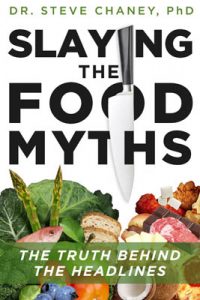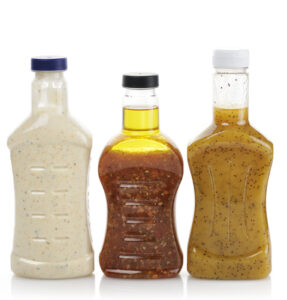Rethinking Seed Oils
Author: Dr. Stephen Chaney
 You can’t believe everything you read on the internet. Food myths abound. And they sound so convincing. The articles you read quote clinical studies supporting their food myth. And they offer plausible sounding explanations for why their food myth is accurate.
You can’t believe everything you read on the internet. Food myths abound. And they sound so convincing. The articles you read quote clinical studies supporting their food myth. And they offer plausible sounding explanations for why their food myth is accurate.
I have written a book, “Slaying the Food Myths”, to help you recognize and avoid food myths.
I started that book by sharing “secrets only scientists” know. The top 2 are particularly relevant.
- Scientists design their studies to disprove existing paradigms. That guarantees there will be studies on both sides of every issue.
- Every study has its flaws. But some have more flaws (are lower quality) than others.
Unfortunately, many of the online posts you read “cherry pick” the studies that support their belief.
- Some of this is innocent. The authors aren’t scientists, so they may not know the studies they quote are of low quality. While their mistake may be innocent, the information they are sharing is still wrong.
- But I am less tolerant of “experts” who base their posts on studies they know are of low quality. I call them “Dr. Strangeloves”.
New food myths arise every day. And recently, food myths about seed oils have started to proliferate. Seed oils have become the latest food villain. It has gotten to the point where many people scan every label to make sure that no seed oil touches their lips.
To help clarify the situation, I have written a recent “Health Tips From the Professor” article debunking the seed oil myths.
Among the myths I discussed was the “seed oils cause inflammation” myth. In today’s “Health Tips From the Professor”, I will delve into that topic more deeply and share the latest research with you.
But before I do that, I need to return to my professor mode and share some background information.
What Are Omega-6 Fatty Acids And Why Do They Matter?
- There are two classes of essential fatty acids – omega-6 and omega-3.
- In each case there is a shorter fatty acid found in plant foods which is converted to a longer fatty acid which, in turn, is converted to a group of regulatory molecules that control a variety of biological functions including blood clotting and inflammation.
-
- For the omega-6 group the shorter fatty acid is linoleic acid (LA), and the longer one is arachidonic acid (AA). Linoleic acid is the major fatty acid found in seed oils.
-
- For the omega-3 group, the shorter fatty acid is linolenic acid, and the longer ones are EPA and DHA.
- Essential fatty acids are the only foods for which it is literally true that, “You are what you eat”.
-
- The membrane composition of every cell in your body reflects the relative amount of omega-6 and omega-3 fatty acids in your diet.
-
- This means the ratio of omega-6 to omega-3 fatty acids in your cell membranes are identical to the ratio of omega-6 to omega-3 fats in your diet.
The significance of these statements will become apparent as I describe the study and its significance below.
What Do We Know About Omega-6 Fatty Acids And Inflammation?
 This is an important question because the omega-6 fatty acid linoleic acid (LA) is the major fatty acid in seed oils. So, when someone makes the claim that seed oil causes inflammation, they are saying that omega-6 fatty acids cause inflammation. So, the question becomes, “Is that true?”
This is an important question because the omega-6 fatty acid linoleic acid (LA) is the major fatty acid in seed oils. So, when someone makes the claim that seed oil causes inflammation, they are saying that omega-6 fatty acids cause inflammation. So, the question becomes, “Is that true?”
For years the answer to this question has been unclear. Some studies have concluded that omega-6 fats decrease inflammation, while other studies suggest they increase inflammation. And, of course, the influencers who warn of the dangers of seed oils have cherry picked the studies showing they increase inflammation while ignoring studies showing they decrease inflammation.
It turns out that studies claiming that omega-6 fats increase inflammation are mostly low-quality studies. So, perhaps we should ask what recent high-quality studies show.
- In 2012 a systematic review of the effects of linoleic acid (LA) on inflammatory markers stated, “We conclude that virtually no evidence is available from randomized, controlled intervention studies among healthy, non-infant human beings to show that addition of LA to the diet increases the concentration of inflammatory biomarkers”.
- Two major meta-analyses that pooled the data from multiple studies found that circulating LA levels were inversely correlated with cardiovascular disease and type 2 diabetes [That means that higher levels of LA correlated with lower levels of heart disease and diabetes].
- A recent report from the UK Biobank study found a strong inverse association between plasma LA levels and both total and cause-specific mortality [Higher levels of LA correlated with a longer life].
- Based on these and other studies, the American Heart Association concluded, “To reduce omega-6 fat intakes from their current levels [in the American diet] would be more likely to increase rather than decrease coronary heart disease.”
Clearly, recent research is trending towards the conclusion that the omega-6 fat found in seed oils reduces inflammation and the risk of major disease.
But the authors of the current study (HTM Lai et al, Nutrients, 17, 2076, 2025) wanted to test that hypothesis in a more rigorous manner.
They examined the association between red blood cell membrane levels of linoleic acid (LA) and arachidonic acid (AA) and 10 biomarkers representing different phases and pathways of inflammation in a large, community-based sample (The Framingham Offspring Study).
How Was This Study Done?
 The investigators used data from the Framingham Offspring Study (children of the original Framingham participants) and the Framingham Omni Cohort (a more ethnically and racially diverse population representing the current Framingham community).
The investigators used data from the Framingham Offspring Study (children of the original Framingham participants) and the Framingham Omni Cohort (a more ethnically and racially diverse population representing the current Framingham community).
There were a total of 2777 participants (mean age 66 years, 54% women, 9.8% minorities). Blood and urine samples were obtained from these participants during their scheduled examinations between 2005 and 2008.
- The levels of linoleic acid (LA) and arachidonic acid (AA) were determined from red blood cell membranes.
- One urinary and nine serum biomarkers of inflammation representing multiple inflammation pathways were measured. (For a list of the biomarkers tested and the rationale for their inclusion in this study, read the article.
Finally, the correlation between the omega-6 fats and biomarkers of inflammation was calculated.
Are Seed Oils Inflammatory?
- Linoleic acid and arachidonic acid combined were inversely correlated with 6 biomarkers of inflammation and had no effect on the other 4.
- The inverse association of linoleic acid with inflammatory biomarkers was not affected by age, gender, or ethnicity.
The authors concluded, “Our community-based study identified small, but significant, inverse associations between red blood cell linoleic and arachidonic levels and six major biomarkers of inflammation…representing a wide variety of inflammatory pathways. Our results suggest that linoleic acid is more likely to be anti- than pro-inflammatory, and the present efforts to reduce its intake are ill advised.”
Revisiting Seed Oils

You might be wondering what this study has to do with seed oils.
- The omega-6 fat linoleic acid is a major component of seed oils (60-75%).
-
- So, claims that seed oils are inflammatory are based on the claim that omega-6 fats are inflammatory.
- This study shows omega-6 fats are more likely to be anti-inflammatory than pro-inflammatory.
- Based on their heart health benefits, the American Heart Association recommends that we not decrease the amount of omega-6 fats in our diet.
-
- Seed oils are the major source of omega-6 fats in our diet.
-
- So, the American Heart Association recommendation about not decreasing omega-6 fats in our diet means that decreasing our use of seed oils is not a good idea.
I have debunked the other myths about seed oils in my previous “Health Tips From the Professor” article.
The only true concerns about seed oils have to do with processing, storage, and purity.
- Omega-6 fats are easily oxidized, and the oxidation process can create free radicals. Free radicals can be created through high heat processing and improper storage.
- Some seed oils contain undesirable impurities in their natural form. So, both the purification process and quality control testing are important.
- And, as with most foods and supplements, it is “buyer beware”. Some manufacturers use the cheapest source of seed oil rather than the highest quality source.
My recommendations are:
- Choose your source carefully.
-
- For seeds and nuts look for freshness. If they look or taste funny, throw them out.
-
- For oils and salad dressings choose reputable brands and choose ones that use low-heat processing.
- Don’t overheat them.
-
- Most vegetable oils are only suitable for use as salad dressings and other room temperature uses.
-
- The exceptions are vegetable oils with high smoke points – for example, olive oil for stir fries and avocado oil for higher temperature cooking.
- Store them safely. Don’t give them a chance to become oxidized.
-
- We store sunflower seeds and almonds in our refrigerator and walnuts in our freezer.
-
- We buy unsaturated vegetable oils in small quantities (so they are used up quickly) and store them in the refrigerator.
- For supplements containing seed oil ingredients choose brands with high quality control standards.
The Bottom Line
Seed oils have become the latest food villain. In a recent “Health Tips From the Professor” I have debunked the seed oil myths.
In today’s article I share the latest studies showing that seed oils are more likely to be anti-inflammatory than pro-inflammatory.
For more information on this study and how to select and use seed oils safely, read the article above.
These statements have not been evaluated by the Food and Drug Administration. This information is not intended to diagnose, treat, cure, or prevent any disease.
_____________________________________________________________________________
My posts and “Health Tips From the Professor” articles carefully avoid claims about any brand of supplement or manufacturer of supplements. However, I am often asked by representatives of supplement companies if they can share them with their customers.
My answer is, “Yes, as long as you share only the article without any additions or alterations. In particular, you should avoid adding any mention of your company or your company’s products. If you were to do that, you could be making what the FTC and FDA consider a “misleading health claim” that could result in legal action against you and the company you represent.
For more detail about FTC regulations for health claims, see this link.
https://www.ftc.gov/business-guidance/resources/health-products-compliance-guidance
______________________________________________________________________
About The Author
 Dr. Chaney has a BS in Chemistry from Duke University and a PhD in Biochemistry from UCLA. He is Professor Emeritus from the University of North Carolina where he taught biochemistry and nutrition to medical and dental students for 40 years. Dr. Chaney won numerous teaching awards at UNC, including the Academy of Educators “Excellence in Teaching Lifetime Achievement Award”. Dr Chaney also ran an active cancer research program at UNC and published over 100 scientific articles and reviews in peer-reviewed scientific journals. In addition, he authored two chapters on nutrition in one of the leading Biochemistry textbooks for medical students.
Dr. Chaney has a BS in Chemistry from Duke University and a PhD in Biochemistry from UCLA. He is Professor Emeritus from the University of North Carolina where he taught biochemistry and nutrition to medical and dental students for 40 years. Dr. Chaney won numerous teaching awards at UNC, including the Academy of Educators “Excellence in Teaching Lifetime Achievement Award”. Dr Chaney also ran an active cancer research program at UNC and published over 100 scientific articles and reviews in peer-reviewed scientific journals. In addition, he authored two chapters on nutrition in one of the leading Biochemistry textbooks for medical students.
Since retiring from the University of North Carolina, he has been writing a weekly health blog called “Health Tips From the Professor”. He has also written two best-selling books, “Slaying the Food Myths” and “Slaying the Supplement Myths”. And most recently he has created an online lifestyle change course, “Create Your Personal Health Zone”. For more information visit https://chaneyhealth.com.
For the past 53 years Dr. Chaney and his wife Suzanne have been helping people improve their health holistically through a combination of good diet, exercise, weight control and appropriate supplementation.


